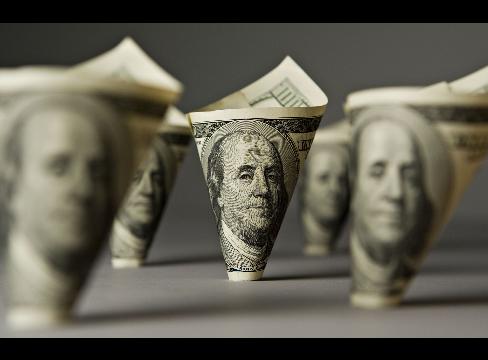
U.S. one hundred dollar bills are displayed for a photograph in New York on Dec. 30, 2008. Photographer: Daniel Acker/Bloomberg News
Dec. 31 (Bloomberg) — The dollar fell, heading for its worst annual decline against the yen in more than two decades, on speculation a U.S. report this week will show manufacturing shrank at the fastest pace since 1980.
The currency was also poised for a third annual loss versus the Swiss franc on bets the Federal Reserve’s zero target lending rate will weigh on demand for the greenback. The euro was set for the largest annual gain against the British pound since its 1999 debut on speculation the Bank of England will keep its main lending rate lower than the European Central Bank’s rate.
“The data is still going to look quite poor,” said Besa Deda, chief economist at St. George Bank Ltd. in Sydney. “It’s negative for the dollar.”
The dollar traded at 90.24 yen as of 8:45 a.m. in Tokyo from 90.34 yen late in New York yesterday and 111.75 at the end of 2007. It has fallen 19 percent this year, the most since 1987. The greenback declined to 1.0557 per franc from 1.0602 yesterday and 1.1335 a year earlier. It also weakened to $1.4136 per euro from $1.4057 yesterday and from $1.4589 last year.
The U.S. currency may reverse this year’s loss against the yen in 2009, according to a Bloomberg News survey of 50 analysts and strategists. They predict the dollar will rise to 100 yen by the end of next year.
The euro gained for an eighth day against the pound, rising 0.2 percent to 97.74 pence from 97.57 pence yesterday when it reached a record 98.03 pence. That’s the longest stretch of gains since March 11, 2005. The euro rose to 127.59 yen from 126.97 yen.
U.S. Economic Reports
The dollar declined for a third day against the yen and a second versus the euro after the New York-based Conference Board reported yesterday its index of consumer confidence fell to an all-time low of 38 this month from 44.7 in November. The group started keeping records in 1967.
The Institute for Supply Management’s December factory index probably dropped to 35.4, the lowest reading in almost three decades, according to a Bloomberg News survey of economists. The report is due on Jan. 2.
The Bank of England reduced its benchmark interest rate by 3.5 percentage points this year to 2 percent to limit the fallout from the global financial crisis. The ECB cut its benchmark to 2.5 percent, 1.5 percentage points lower than at the start of 2008, with some policy makers indicating they may be reluctant to lower borrowing costs again next month.
The Fed cut its benchmark interest rate this month to a range of zero to 0.25 percent for the first time and shifted its focus to debt purchases to revive the economy.
Such so-called quantitative easing “would raise more concerns about the dollar in the medium- to long-term,” Deda said. “Over the medium-term we don’t favor a stronger dollar.”
To contact the reporters on this story: Ron Harui in Singapore at [email protected]
Last Updated: December 30, 2008 19:37 EST
By Ron Harui
Source: Bloomberg